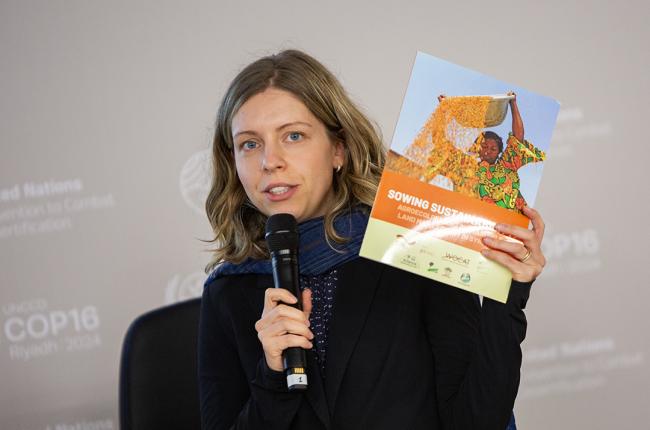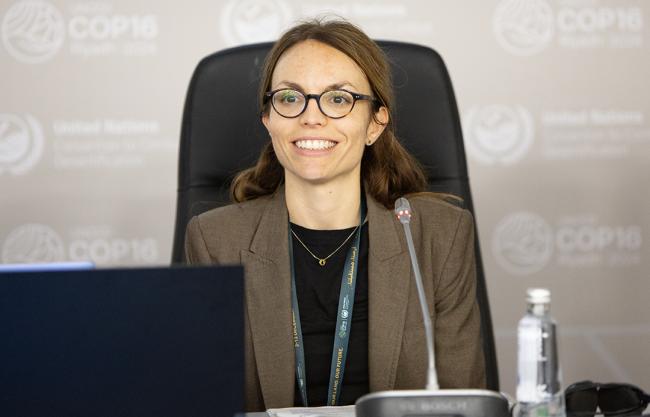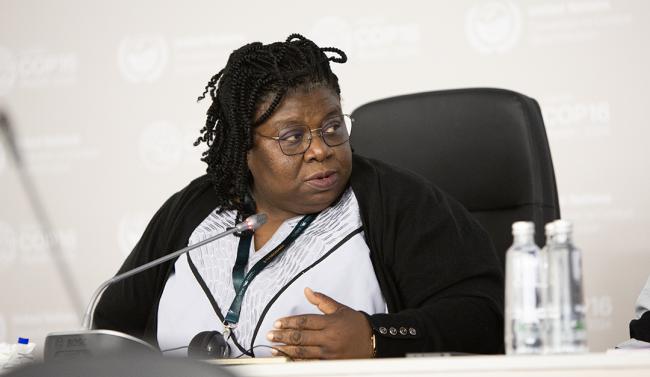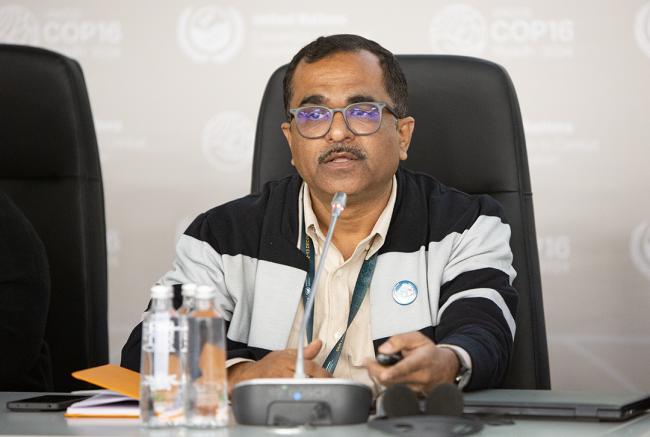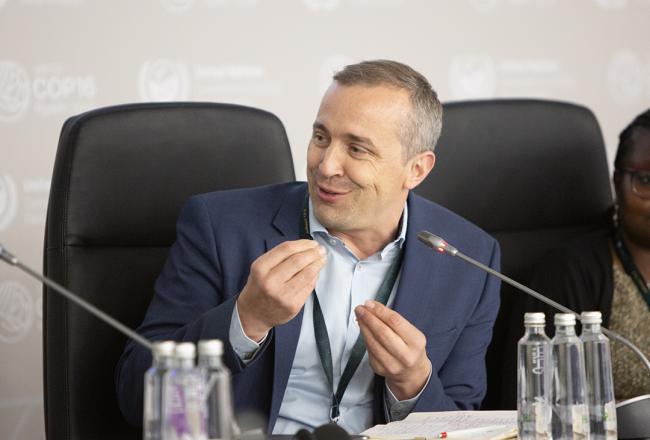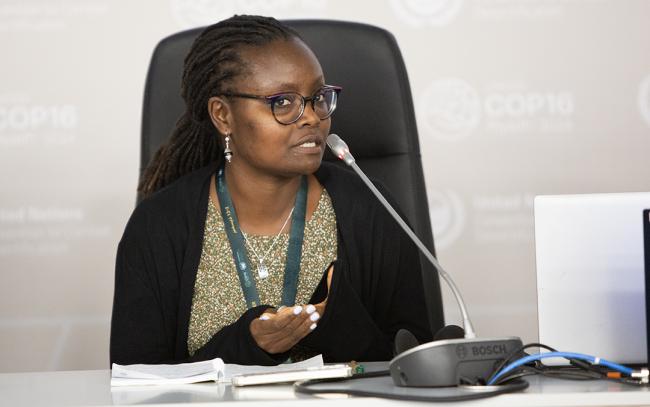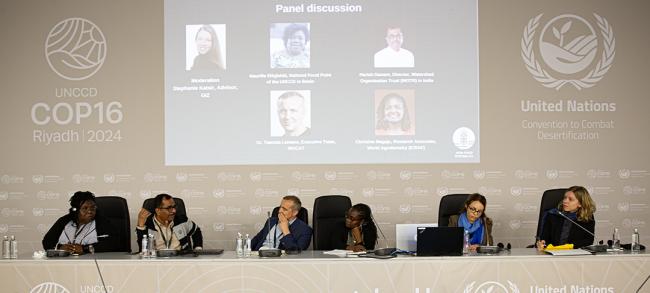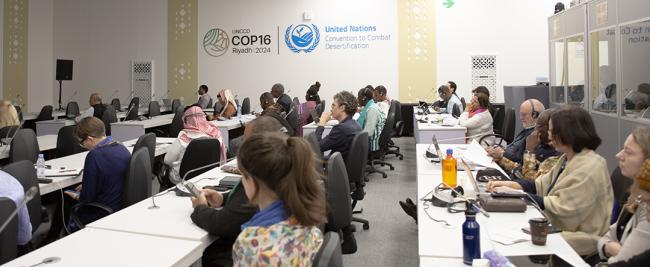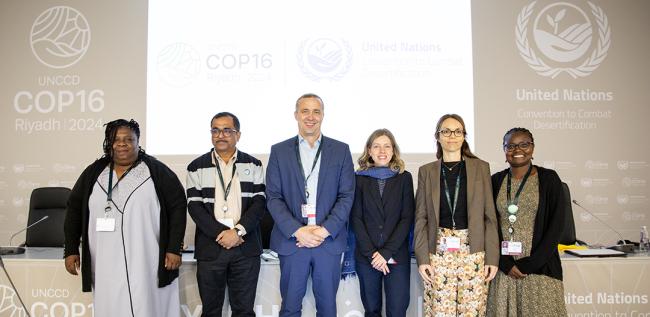About
Germany’s PROSOIL program for soil protection and food security goes beyond changes in agricultural practice. Program participants noted that land tenure policies, participatory water budgeting and women-led initiatives all matter for soil health.
Germany is one of the world’s largest supporters of sustainable agriculture and hosts the UNCCD Secretariat in Bonn. This event showcased Germany’s practical work on the ground in helping farmers restore soil fertility and document the positive impacts of activities, through its support to the Global Programme on Soil Protection and Rehabilitation for Food Security (ProSoil).
Stephanie Katsir, ProSoil, German Corporation for International Cooperation (GIZ), moderated the event.
Fiona Becker, Agriculture and Rural Development Division, German Federal Ministry for Economic Cooperation and Development (BMZ), noted that, since 2014, BMZ has supported 344 projects with 3.65 billion Euros, with the aim of reducing reliance on external inputs to agriculture through integrated soil fertility management approaches. She highlighted that ProSoil has supported 290,000 smallholder farmers and benefited two million people, around 45% of them women. Among the project’s successes, she cited increased agricultural productivity in central Burkina Faso, which has led to an annual food surplus of 11,000 tons of grain.
Becker highlighted Germany’s support for the World Overview of Conservation Approaches and Technology (WOCAT), to support the use of information and knowledge, tools for data standardization, and open access to data generated through ProSoil, noting its documentation of many good practices.
Panelists then provided their perspectives on the programme and its impacts.
Maurille Elégbédé, UNCCD National Focal Point, Benin, highlighted the value of on-farm demonstrations in developing practices that are acceptable to local communities and proving it is possible to restore soil fertility. Among the project outcomes, she noted the positive impact of women-led initiatives in sustainable land management (SLM), and the creation of an expert panel on land management that now provides advice to all ministries as needed.
Another participant from Benin further highlighted that the ProSoil project in Benin has enabled the publication of a practical guide that other government departments can use to implement best practices.
Harish Daware, Watershed Organisation Trust, India, explained that ProSoil in India had worked in three locations that were experiencing common problems of water scarcity, low incomes, and poverty. He recounted activities to restore a catchment area through soil conservation and soil rehabilitation to increase productivity, based on the participation of local communities and individuals. He noted, in particular, the approach of participatory water budgeting to enable the equitable and judicious use of water, and the introduction of climate-resilient agricultural practices, such as nutrient management, vermicomposting, system of crop intensification, soil testing and soil health cards, and crop-weather advisories for which farmers themselves contribute data. Among the project’s successes, he noted that more than 70,000 farmers in four states in India have downloaded the app for crop-weather advisories. He emphasized the value of women’s roles in adopting agro-ecological practices, and the establishment of farmer producer companies.
Tatenda Lemann, Executive Team, WOCAT, explained that WOCAT seeks to document and share SLM knowledge at all scales through linkages with other global, regional, and national platforms—including, for example, the G20 global information hub.
Christine Magaju, World Agroforestry (ICRAF), noted that agro-ecological practices have increased farm productivity and household incomes, improved soil health and nutrition, and protected biodiversity. She noted multi-country research has illustrated that many households need support to move beyond the initial stage of the transition to sustainable agriculture.
In a question-and-answer session with panelists, a participant from Senegal asked about the barriers to scaling these initiatives. Élégbédé responded that applying practices from one zone to another requires taking into account local conditions such as the nature of the soil and rainfall, and the types of seeds. She concurred that having evidence and results is the starting point, and one constant is that compost is effective everywhere. Becker added that scaling requires political will, and Lemann stressed the importance of talking about failures, so others can learn from these experiences.
A participant from Saudi Arabia said one of the main barriers for investment in African countries is land ownership and government policies. Lemann, agreeing that land ownership is the elephant in the room, mentioned that WOCAT is working with the Food and Agriculture Organization of the UN (FAO) to identify the land tenure model most associated with good practices.
Referring to the question of whether transitions to agro-ecology generally start from top-down or bottom-up pressures, Daware responded that the driving force should be the community and civil society. Magaju suggested the main point is not who started the conversation, but what is happening to upscale solutions. Élégbédé added that research is an additional lever to initiate action, as it attracts attention to the problem of land degradation and helps the government take decisions.
Another participant from Burkina Faso raised the question of constraints to the promotion of agro-ecology, mentioning, for example, barriers to knowledge transfer, lack of recognition of land rights, and the fact that organic fertilizers require water that is not always available. Daware noted that technology transfer is possible through digital tools and applications. Lemann pointed out that maintenance is key for good practice, as many projects fail to anticipate future costs and how they can be covered.
In closing, Katsir asked the panelists to provide thoughts on the best ways to “fail forward” by learning from mistakes. Magaju and Daware both highlighted the importance of “co-learning” in terms of farmers learning from other farmers what does and does not work. Lemann said WOCAT is making efforts to ensure that its database does not continue to showcase good practices that were established ten years ago, which may no longer be relevant. Élégbédé underscored the importance of having an evaluation process to ensure a constant dynamic of improvement.
Organizer: GIZ
Contact: stephanie.katsir@giz.de
Website: https://wocat.net/en/projects-and-countries/projects/prosoil/

